中考专项复习——简单句并列句复合句
图片预览
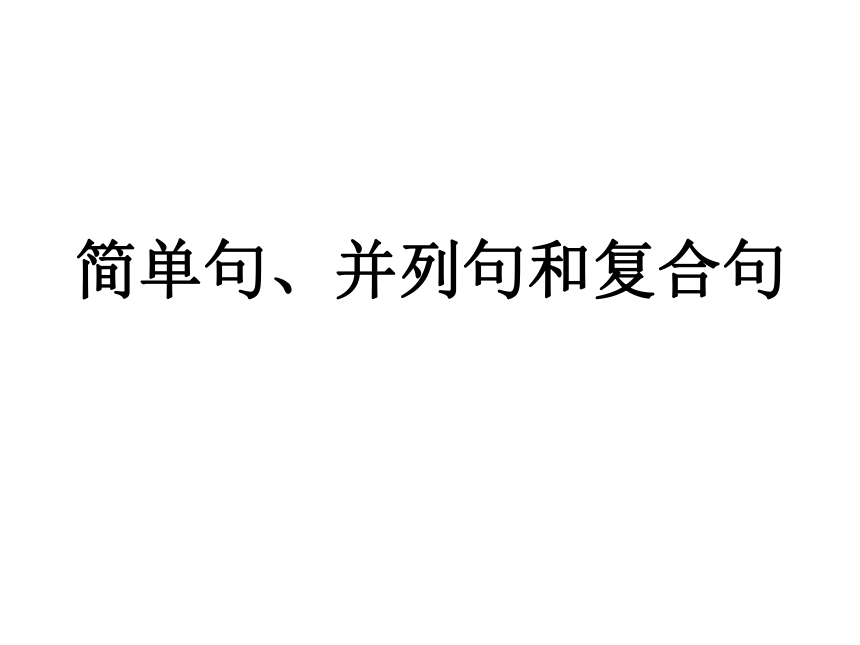
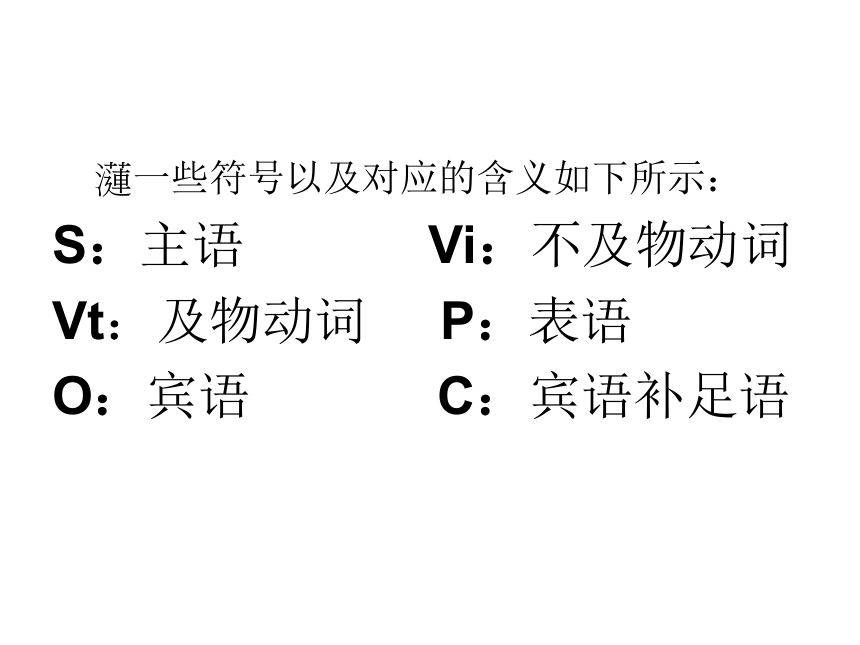
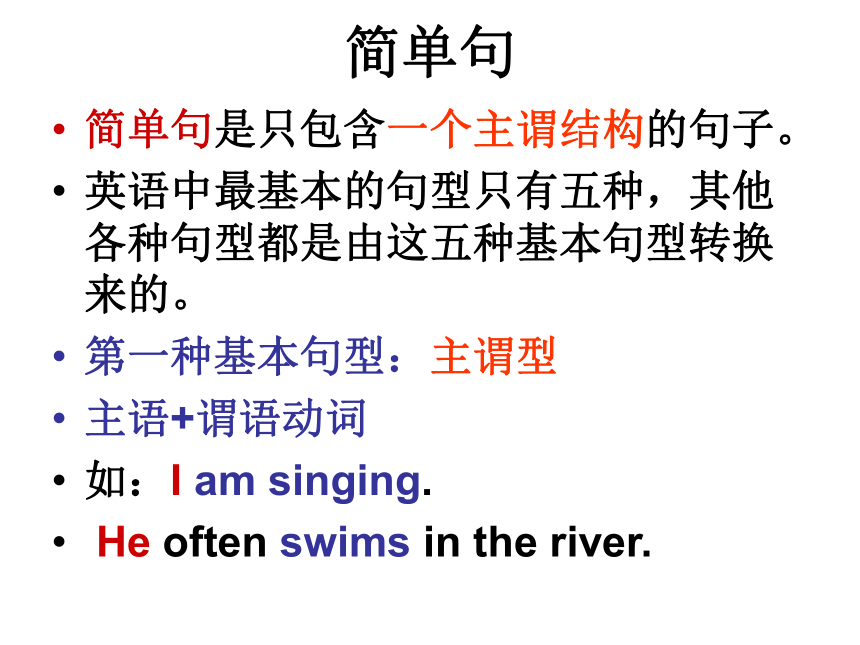
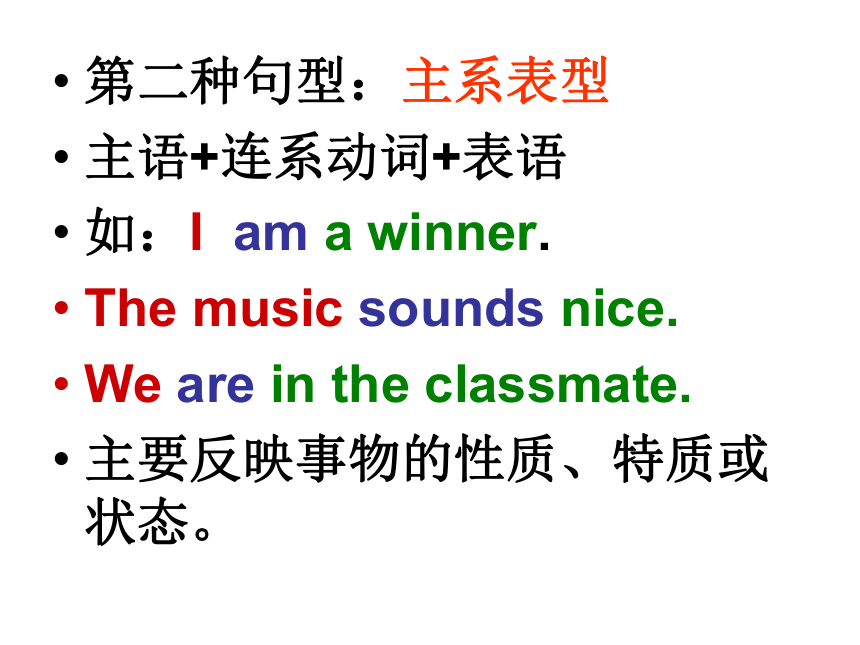
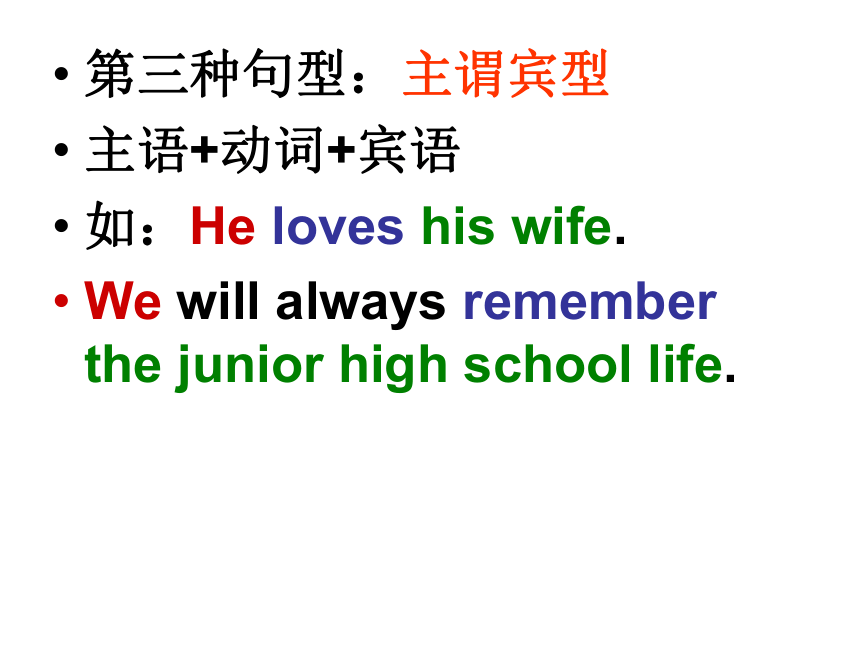
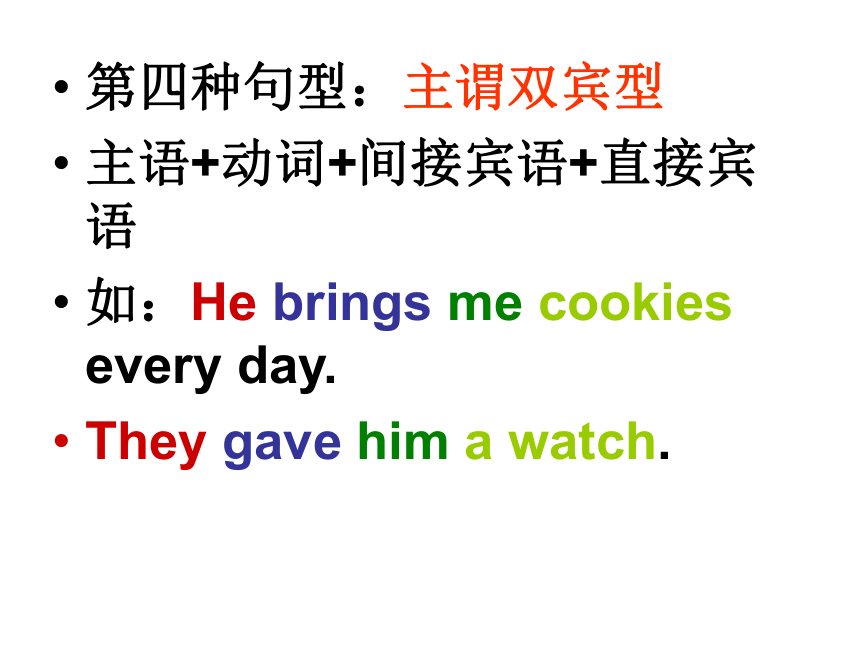
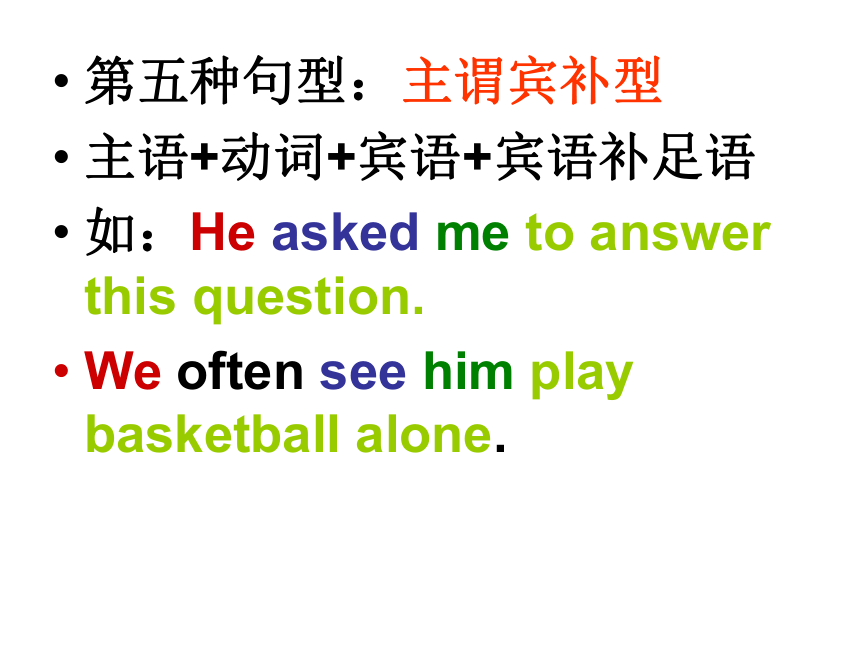
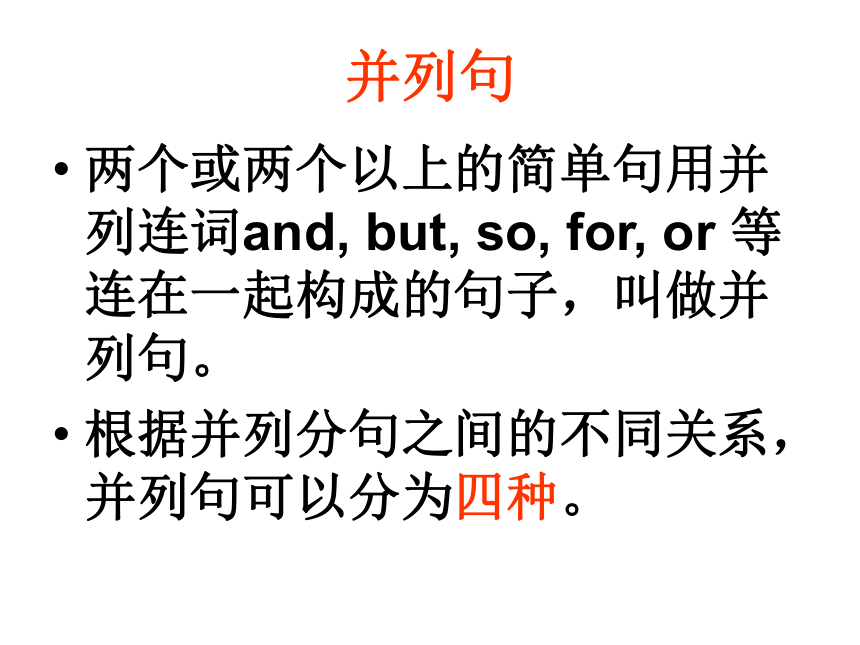
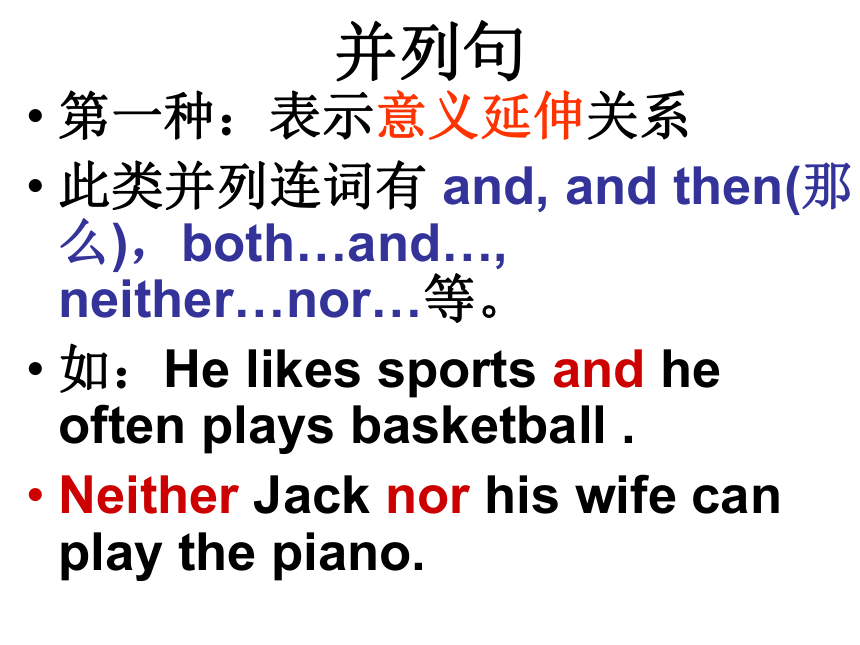
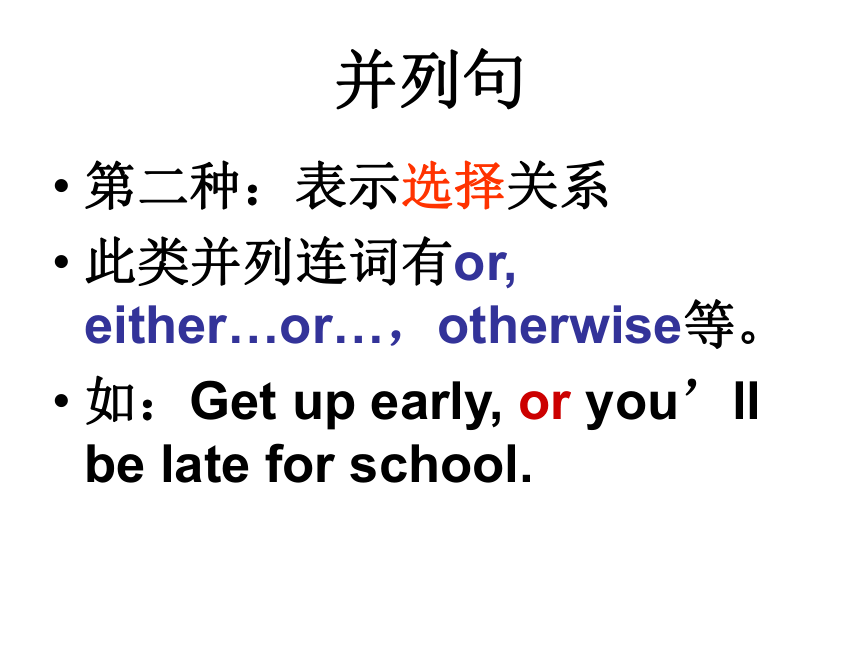

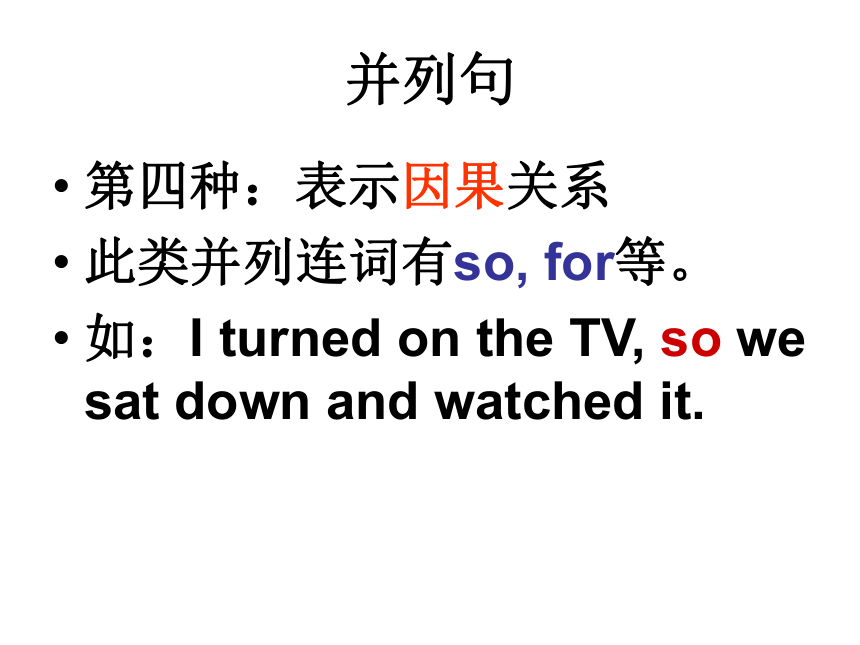
文档简介
课件67张PPT。简单句、并列句和复合句 ?一些符号以及对应的含义如下所示:
S:主语 Vi:不及物动词
Vt:及物动词 P:表语
O:宾语 C:宾语补足语简单句简单句是只包含一个主谓结构的句子。
英语中最基本的句型只有五种,其他各种句型都是由这五种基本句型转换来的。
第一种基本句型:主谓型
主语+谓语动词
如:I am singing.
He often swims in the river.
第二种句型:主系表型
主语+连系动词+表语
如:I am a winner.
The music sounds nice.
We are in the classmate.
主要反映事物的性质、特质或状态。第三种句型:主谓宾型
主语+动词+宾语
如:He loves his wife.
We will always remember the junior high school life. 第四种句型:主谓双宾型
主语+动词+间接宾语+直接宾语
如:He brings me cookies every day.
They gave him a watch.第五种句型:主谓宾补型
主语+动词+宾语+宾语补足语
如:He asked me to answer this question.
We often see him play basketball alone.并列句两个或两个以上的简单句用并列连词and, but, so, for, or 等连在一起构成的句子,叫做并列句。
根据并列分句之间的不同关系,并列句可以分为四种。并列句第一种:表示意义延伸关系
此类并列连词有 and, and then(那么),both…and…, neither…nor…等。
如:He likes sports and he often plays basketball .
Neither Jack nor his wife can play the piano.并列句第二种:表示选择关系
此类并列连词有or, either…or…,otherwise等。
如:Get up early, or you’ll be late for school.并列句第三种:表示转折关系
此类并列连词有 but, however, while,yet(然而) 等。
如:The old woman lives alone, but she never feels lonely.并列句第四种:表示因果关系
此类并列连词有so, for等。
如:I turned on the TV, so we sat down and watched it.复合句复合句是由一个主句和一个或一个以上的从句构成。
三种常用的从句宾语从句在句中起宾语作用的从句。
1.注意正确使用引导词
(1)当宾语从句由陈述句变化而来时,用that来引导从句,其中的that无具体意义,一般可以省略。
He tells me (that) he is going shopping this Sunday.
他告诉我说本周日他要去购物。
She said (that) the bank was near the hotel.
她说银行就在宾馆附近。
(2)当宾语从句由一般疑问句变化而来时,可用if或whether来引导从句,意为“是否”。
She asked me if (whether) she could join us.
她问我她是否可以加入我们的队伍。
He wondered if (whether) the workers had finished the work.
他想知道,工人们是否已经完成了工作。
(3)当宾语从句由特殊疑问句变化而来时,特殊疑问词就是宾语从句的引导词,如who, whose, what, which, when, where, why, how 等。
Do you know who broke the door?
你知道谁弄坏了门吗?
She asked me whose pen that was.
她问我那是谁的钢笔。
She asked them what they were doing.
她问他们正在做什么。Tell me which one you want. 告诉我你要哪一个。
He asked me when I would set out.
他问我什么时候出发。
—Do you know ________ the man with glasses is?
—A reporter, I think.
A.what B.that
C.who D.where
2.注意正确使用语序
(1)在含有宾语从句的复合句中,宾语从句都要使用陈述语序,即“引导词+主语+谓语+其他”。
When did the train leave? I want to know.
→I want to know when the train left.
Does the shop close at six every day? Do you know?
→Do you know if/whether the shop closes at six every day?(2)如果是由do, does, did构成的疑问句,在转换为宾语从句时,要去掉do, does, did,且从句中的谓语动词要根据主句时态作出相应的变化。
Do they often play basketball?He asked.
→He asked if they often played basketball.
What time did she get up? The young man asked.
→The young man asked what time she got up. (3)如果是will, be, have, can组成的疑问句,在变为宾语从句时,需把will, be, have, can返回到句中原来的谓语位置上,并根据主句时态作相应的变化。
Will you be free tomorrow?She asked me.
→She asked me if (whether) I would be free the next day.
Has she seen the movie yet? I want to know.
→I want to know if (whether) she has seen the movie yet. 3.注意正确使用时态
(1)如果主句是一般现在时、一般将来时或祈使句时,宾语从句的时态不受限制,可以根据实际表达的需要来确定。
Could you tell me what he said at the meeting?
你能告诉我他在会上说了什么吗?(一般过去时)
He will tell us that he has been able to look after himself.
他将告诉我们他已经能够照顾自己了。(现在完成时)
Tell him when we will start.
告诉他我们将什么时候动身。(一般将来时) (2)如果主句是一般过去时,宾语从句应与主句保持一致,即使用过去时态的某种形式。
He said that he was born in Wuhan in 1985.
他说他于1985年出生在武汉。
They said that they had already finished the work.
他们说他们已经完成了工作。(3)如果宾语从句所叙述的是客观事实、格言、科学真理等时,从句时态不受主句限制,用一般现在时。
Everyone knew there are sixty minutes in an hour.
大家都知道一小时是60分钟。(客观事实)
She said that two heads are better than one.
她说三个臭皮匠赛过一个诸葛亮。(格言)
He said that light travels faster than sound.
他说光比声音传播得快。(科学真理)4.否定前移
在宾语从句中,当主句的谓语动词为think(认为), believe(相信), expect(期望), imagine(想象), suppose(猜测)等时,如果主句主语为I(we)时,从句中表示否定意义的not应移到think, believe, expect, imagine, suppose前。
I don't think he is right. 我认为他不对。
I don't suppose he will come. 我猜测他不会来。
注意:如果主句主语不是I(we),则not不前移。
She thinks her answer is right. 她认为她的答案正确。
→She thinks her answer isn't right.
她认为她的答案不正确。
状语从句 引导词
时间状语从句 when, while, as, before, after, until(till), as soon as, since
条件状语从句 if, unless
原因状语从句 because, as, since
结果状语从句 so...that..., such...that...
目的状语从句 so that, in order that
让步状语从句 though, although, even if, even though, no matter...
比较状语从句 than, as...as... (一)时间状语从句
1.when引导的时间状语从句
连词when的意思是“当……时候”, when引导的时间状语从句的动作和主句的动作可以是同时发生,也可以是先后发生。即可指时间点,也可指时间段。
She was cooking when someone knocked at the door.
有人敲门时,她正煮饭。(先后发生)
My father was reading a newspaper when I was sleeping. 当我睡觉的时候,父亲在看报。(同时发生)
What was your mother doing when you came back?
你回来时你妈妈在做什么?(时间点)
When I was a child, I used to go to the Great Wall.
当我还是个小孩子的时候,我常常去长城。(时间段)
2.while 引导的时间状语从句
连词while的意思是“当……时”, while引导时间状语从句时,谓语动词必须是延续性动词。while若出现在过去进行时的句子中,结构一般是“while +过去进行时,一般过去时”。
While I was shopping, the UFO landed.
我购物的时候,不明飞行物降落了。3.as引导的时间状语从句
as引导的时间状语从句,表示“当……时”或“一边……一边”,主句和从句的动作同时发生。
As the children walked along the lake, they sang happily. 孩子们一边沿着湖走,一边愉快地唱歌。
As he was a child, he began to learn to play the piano.
当他还是个小孩的时候,他就开始学弹钢琴了。
注意:as引导的时间状语从句的主语与主句的主语常为相同的人或物。4.before引导的时间状语从句
在...之前
He had studied in this school before he joined the army.
参军之前,他在这所学校学习过。
Jane, please turn off the lights ________ you leave the classroom.
A.after B.before C.until D.but5.after引导的时间状语从句 在...之后。
After he locked the door, he left.
注意:如果主句的动作发生在从句之后,可以转换为not...until(before)...引导的时间状语从句。
He left the classroom after he finished his homework.
→He didn't leave the classroom until (before) he finished his homework. 他完成作业后才离开教室。6.until(till)引导的时间状语从句
until意思是“直到……”,主从句都是肯定句,主句的谓语动词为延续性动词,此时until=till。表示“直到……才……”时,主句用否定句,从句用肯定句,主句中的谓语动词为非延续性动词。
They worked until (till) it was dark.
I didn't go to bed until she came back. 直到她回来我才睡觉。
注意:until与till引导时间状语从句时,通常可以交换使用,但如果从句在句首,则只能使用until。
Until he went there he didn't know that.
直到他到那儿,他才知道那件事。7.as soon as 引导的时间状语从句
“一……就……”
As soon as he came into the room, I would tell him that thing. 他一走进房间,我就告诉他那件事。
Please write to us as soon as you get there.
你一到那儿,就请给我们写信。
I'll come to see you as soon as I arrive there.
我一到那儿,就去看你。
注意?as soon as 引导的从句为时间状语从句,当主句是一般将来时态时,从句要用一般现在时。(主将从现)
He will return the book as soon as he finishes it.
他一看完这本书就去归还。
8.since引导的时间状语从句
since意思是“自从……”,它引导的从句中的动词多用过去式,表示动作的起点。主句表示动作的延续,用现在完成时。如果主句中的动作表示的不是延续性动作而是目前的状态,主句可用一般现在时。
I haven't heard from my friend since I went to Dalian.
我到大连后就没有收到过我朋友的信。
It is ten years since she left here.
自从她离开这儿后,已经10年了。(二)条件状语从句
1.if 引导的条件状语从句
if 意思是“如果……就……”。如果主句是一般将来时, if引导的从句就要用一般现在时。(主将从现)
If it doesn't rain, I'll go fishing.
如果不下雨,我就去钓鱼。
I'll go to see you if I have time.
如果我有时间,我会去看你的。2.unless引导的条件状语从句
unless意思是“除非;如果不”,相当于if not。如果主句是一般将来时, unless引导的从句就要用一般现在时。(主将从现)
Unless you work hard, you won't pass the exam.
除非你努力学习,否则你会考试不及格的。
They will have a picnic unless it rains next Sunday.
注意?当if引导的从句为否定句时,可以与unless相互转化。
If he isn't busy, he'll come to meet us.
=Unless he is busy, he'll come to meet us. (三)原因状语从句
1.because 引导的原因状语从句
because 表示最直接的原因,为why问句的答语。
He didn't come because he was ill.
他没有来是因为他病了。
He didn't catch the first bus because he got up too late.
因为他起床太晚了,所以没有赶上第一班车。
注意?because 引导的从句不能与so(所以)连用。
因为我取得了好成绩,所以我妈妈很高兴。
(×)Because I got a good mark, so my mother was happy.
(√)Because I got a good mark, my mother was happy.
(√)My mother was happy because I got a good mark.
2.as引导的原因状语从句
as可以引导原因状语从句,表示“正如所知道的那样”。as从句说明原因,主句说明结果,主从句并重。
As it was raining, I stayed at home.
由于下雨,我便待在家里。
As you can see, Lucy doesn't like studying at all.
正如你所看到的那样,露西根本不喜欢学习。
3.since引导的原因状语从句
since 意思是“因为;既然”,侧重主句, since从句表示显然的或已经知道的理由。
We should study hard since we are students.
既然我们是学生,我们就应该努力学习。
Since we have got ready for it, let's set off.
既然我们已经准备好了,那就出发吧。
(四)结果状语从句
1.so...that...引导的结果状语从句
so...that...意思是“如此……以至于……”, so后接形容词或副词, 而在that引导的从句中, 行为动词前通常有情态动词can或could。
It's so hot that we want to go swimming.
天太热了, 我们想去游泳。
The box is so heavy that we can't carry it.
这箱子太重了,我们搬不动。
2.such...that...引导的结果状语从句
such...that...意思是“如此……以至于……”, such后用名词。
She is such a lovely girl that we all like her.
她是一个如此可爱的女孩,我们都喜欢她。
It is such a heavy box that nobody can move it away.
这个箱子很重,没有人能搬动它。
3.so...that...和such...that...的区别
(1)so...that...与such...that...意思相同,二者可以交换使用,其区别在于so后跟形容词或副词, such后跟名词。
That's such an interesting story that everybody likes it.
=That's so interesting a story that everybody likes it.
那是一个如此有趣的故事,大家都喜欢它。
(2)但如果是形容词 many, much, few, little(少)修饰名词时,则只能使用 so...that...。
We have so much time that we can finish the work.
我们有足够的时间,能完成这项工作。 (五)目的状语从句
1.so that 引导的目的状语从句
so that 意为“以便;为了”, so that 引导的从句只能放在主句之后,从句中常用 can, could, may, might 等情态动词。
Please say it in a loud voice so that everyone can hear it.
请大声说,以便大家都能听见。
He got up early so that he could get there in time.
他起得早是为了能及时赶到那里。
注意?so that 引导的目的状语从句可以用 in order to 转换为简单句。
I shall write down your phone number so that I may not forget it. =I shall write down your phone mumber in order not to forget it. 我将记下你的电话号码,以免忘记它。
2.in order that 引导的目的状语从句
in order that 的意思是“为了;以便”, in order that 引导的从句可放于句首,也可放于句尾,但从句中依然要使用can, could, may, might 等情态动词。
He works harder in order that he can go to a good college. 为了上一所好的大学,他更加努力地学习。
They left early in order that they could catch the early bus. 他们早些离开是为了能赶上早班车。
(六)让步状语从句
1.though/ although 引导的让步状语从句。though/although 意思是“虽然;但是”, though 与 although 一般情况下可以换用,但如果是与 even, as 连用时,只能使用 though。
He would not be happy though he should have to live alone. 即使他不得不独自生活,他也不会快乐。
He often helps others though/ although he is not rich.
尽管他不富裕,但他经常帮助别人。
注意?though, although 与but 不能出现在同一组主从复合句中,二者只能保留其一,但是可以与still连用。
尽管他年轻,但他懂得多。
(×)Although he is young, but he knows a lot.
(√)He is young, but he knows a lot.
(√)Although/ Though he is young, he(still) knows a lot.
2.even if/ even though 引导的让步状语从句
even if 与 even though 意思相同,都是“即使”, even if/even though 引导的从句可以放在主句之后,也可以放在主句之前。
He'll go there even though/if the weather is bad.
尽管天气恶劣,他也要去那里。
Even if we could afford it, we wouldn't go abroad.
尽管我们承担得起这笔费用,我们也不到国外去。
3.no matter...短语引导的让步状语从句
I'll help him no matter how/ however difficult I am.
不管我有多困难,我都会帮助他。
No matter what/ Whatever you say, I won't change my mind. 不管你说什么,我都不会改变主意。
(七)比较状语从句
1.than 引导的比较状语从句
than 意思是“比……”, than前使用形容词、副词的比较级,如果从句中有与主句相同的部分,在口语中常省略。
He is more outgoing than I. 他比我外向。
She jumped higher than Rose. 她比罗斯跳得高。
2.as...as引导的比较状语从句
as...as 意思是“跟……一样”, as 后接形容词、副词的原级,其否定形式not as/so...as 意思是“不及……”。
He ran as fast as Mike. 他和迈克跑得一样快。
It isn't so/as easy as you think.
这不像你想得那么容易。
We don't have much homework now and our schoolbags are ________ they used to be.
A.as heavy as B.not as heavy as
C.as heavily as D.not as heavily as 三、定语从句
(1)概念:修饰某一名词或代词的从句。
定语从句一般紧跟在它所修饰的先行词之后。
(2)先行词:被定语从句修饰的词叫先行词。
(3)关系词:引导定语从句的词叫关系词。如that, which, who, whom, whose等。
The woman(先行词) who(关系词) read the book is my sister.
2.关系代词的基本用法
先行词 作主语 作宾语
人 who/that who/whom/that
物 which/that which/that/省略
whose(后加名词,紧跟先行词,“...的”)
(1)who 指人,在定语从句中作主语。
The man who spoke at the meeting is from Hong Kong.
会上发言的人来自香港。
The number of people who lost homes reached 250,000.
失去家园的人数多达250 000。
注意:当关系代词在从句中作主语时,从句的谓语动词要与先行词保持主谓一致。
He is one of the boys who like playing basketball.
他是喜欢打篮球的男孩子之一。
He is the one of the boys who likes playing basketball.
他就是那些男孩中喜欢打篮球的那个。(2)whom指人,在定语从句中作宾语,常可省略。
The lady (who/whom) he is talking to is his girlfriend.
和他正在交谈的女士是他的女友。
The athlete (who/whom) I liked most was Carl Lewis.
我最喜欢的运动员是卡尔· 刘易斯。(3)which指物,在定语从句中作主语或宾语,作宾语时常省略。
The building which is being built will be used as a hospital. 正在建设中的这幢建筑将被用作医院。(主语)
I don't like the story which he told me a few days ago.
我不喜欢几天前他给我讲的那个故事。(宾语)
(4)that可以指人,也可以指物。指人时,相当于who或whom;指物时,相当于which;that作宾语时,常省略。
The woman athlete that(who/whom) I read about in the newspaper has just won a gold medal. 我在报纸上看到过的那位女运动员刚刚获得了一枚金牌。(指人,作宾语)
Tomato is a useful vegetable that(which) is good for health. 西红柿是一种对健康很有益的蔬菜。(指物,作主语)
The city ________ we visited a few years ago is more beautiful than before. (5)whose 通常指人,也可以指物,在定语从句中作定语。
I visited a scientist whose name is known all over the world. 我拜访了一位世界知名的科学家。(指人)
Mr Green lives in a house whose roof is red.
格林先生住在一座红屋顶的房子里。(指物)
Do you remember the boy _______ mother works in our school?
3.下列情况,只能用that引导
(1)当先行词是 all, little, much, none, everything, anything, nothing 等代词时。
Is there anything(that)you don't understand?
你还有不懂的地方吗?
Tom told his mother all that had happened.
汤姆把发生的一切告诉了他的妈妈。
(2)当先行词前面有the only, very, the last ,the same等修饰时(当先行词是人时,也可用关系代词who, whom)。
He is the only person that (who) can help you.
他是唯一一个能帮你的人。
(3)当序数词或形容词最高级修饰先行词时。
This is the best book (that) I have ever read.
这是我读过的最好的书。
(4)当先行词前面有only, all, any, no 等修饰时。
I want to read all the books that were written by Lu Xun.
我想把鲁迅的书全读完。
(5)当主句是以疑问词who、which、what、where、there等开头的特殊疑问句时。
Who is the boy that is playing football?
正在踢足球的男孩是谁?
(6)当先行词是既是人又是物时。
They are talking about the people and their hobbies that interest him.
S:主语 Vi:不及物动词
Vt:及物动词 P:表语
O:宾语 C:宾语补足语简单句简单句是只包含一个主谓结构的句子。
英语中最基本的句型只有五种,其他各种句型都是由这五种基本句型转换来的。
第一种基本句型:主谓型
主语+谓语动词
如:I am singing.
He often swims in the river.
第二种句型:主系表型
主语+连系动词+表语
如:I am a winner.
The music sounds nice.
We are in the classmate.
主要反映事物的性质、特质或状态。第三种句型:主谓宾型
主语+动词+宾语
如:He loves his wife.
We will always remember the junior high school life. 第四种句型:主谓双宾型
主语+动词+间接宾语+直接宾语
如:He brings me cookies every day.
They gave him a watch.第五种句型:主谓宾补型
主语+动词+宾语+宾语补足语
如:He asked me to answer this question.
We often see him play basketball alone.并列句两个或两个以上的简单句用并列连词and, but, so, for, or 等连在一起构成的句子,叫做并列句。
根据并列分句之间的不同关系,并列句可以分为四种。并列句第一种:表示意义延伸关系
此类并列连词有 and, and then(那么),both…and…, neither…nor…等。
如:He likes sports and he often plays basketball .
Neither Jack nor his wife can play the piano.并列句第二种:表示选择关系
此类并列连词有or, either…or…,otherwise等。
如:Get up early, or you’ll be late for school.并列句第三种:表示转折关系
此类并列连词有 but, however, while,yet(然而) 等。
如:The old woman lives alone, but she never feels lonely.并列句第四种:表示因果关系
此类并列连词有so, for等。
如:I turned on the TV, so we sat down and watched it.复合句复合句是由一个主句和一个或一个以上的从句构成。
三种常用的从句宾语从句在句中起宾语作用的从句。
1.注意正确使用引导词
(1)当宾语从句由陈述句变化而来时,用that来引导从句,其中的that无具体意义,一般可以省略。
He tells me (that) he is going shopping this Sunday.
他告诉我说本周日他要去购物。
She said (that) the bank was near the hotel.
她说银行就在宾馆附近。
(2)当宾语从句由一般疑问句变化而来时,可用if或whether来引导从句,意为“是否”。
She asked me if (whether) she could join us.
她问我她是否可以加入我们的队伍。
He wondered if (whether) the workers had finished the work.
他想知道,工人们是否已经完成了工作。
(3)当宾语从句由特殊疑问句变化而来时,特殊疑问词就是宾语从句的引导词,如who, whose, what, which, when, where, why, how 等。
Do you know who broke the door?
你知道谁弄坏了门吗?
She asked me whose pen that was.
她问我那是谁的钢笔。
She asked them what they were doing.
她问他们正在做什么。Tell me which one you want. 告诉我你要哪一个。
He asked me when I would set out.
他问我什么时候出发。
—Do you know ________ the man with glasses is?
—A reporter, I think.
A.what B.that
C.who D.where
2.注意正确使用语序
(1)在含有宾语从句的复合句中,宾语从句都要使用陈述语序,即“引导词+主语+谓语+其他”。
When did the train leave? I want to know.
→I want to know when the train left.
Does the shop close at six every day? Do you know?
→Do you know if/whether the shop closes at six every day?(2)如果是由do, does, did构成的疑问句,在转换为宾语从句时,要去掉do, does, did,且从句中的谓语动词要根据主句时态作出相应的变化。
Do they often play basketball?He asked.
→He asked if they often played basketball.
What time did she get up? The young man asked.
→The young man asked what time she got up. (3)如果是will, be, have, can组成的疑问句,在变为宾语从句时,需把will, be, have, can返回到句中原来的谓语位置上,并根据主句时态作相应的变化。
Will you be free tomorrow?She asked me.
→She asked me if (whether) I would be free the next day.
Has she seen the movie yet? I want to know.
→I want to know if (whether) she has seen the movie yet. 3.注意正确使用时态
(1)如果主句是一般现在时、一般将来时或祈使句时,宾语从句的时态不受限制,可以根据实际表达的需要来确定。
Could you tell me what he said at the meeting?
你能告诉我他在会上说了什么吗?(一般过去时)
He will tell us that he has been able to look after himself.
他将告诉我们他已经能够照顾自己了。(现在完成时)
Tell him when we will start.
告诉他我们将什么时候动身。(一般将来时) (2)如果主句是一般过去时,宾语从句应与主句保持一致,即使用过去时态的某种形式。
He said that he was born in Wuhan in 1985.
他说他于1985年出生在武汉。
They said that they had already finished the work.
他们说他们已经完成了工作。(3)如果宾语从句所叙述的是客观事实、格言、科学真理等时,从句时态不受主句限制,用一般现在时。
Everyone knew there are sixty minutes in an hour.
大家都知道一小时是60分钟。(客观事实)
She said that two heads are better than one.
她说三个臭皮匠赛过一个诸葛亮。(格言)
He said that light travels faster than sound.
他说光比声音传播得快。(科学真理)4.否定前移
在宾语从句中,当主句的谓语动词为think(认为), believe(相信), expect(期望), imagine(想象), suppose(猜测)等时,如果主句主语为I(we)时,从句中表示否定意义的not应移到think, believe, expect, imagine, suppose前。
I don't think he is right. 我认为他不对。
I don't suppose he will come. 我猜测他不会来。
注意:如果主句主语不是I(we),则not不前移。
She thinks her answer is right. 她认为她的答案正确。
→She thinks her answer isn't right.
她认为她的答案不正确。
状语从句 引导词
时间状语从句 when, while, as, before, after, until(till), as soon as, since
条件状语从句 if, unless
原因状语从句 because, as, since
结果状语从句 so...that..., such...that...
目的状语从句 so that, in order that
让步状语从句 though, although, even if, even though, no matter...
比较状语从句 than, as...as... (一)时间状语从句
1.when引导的时间状语从句
连词when的意思是“当……时候”, when引导的时间状语从句的动作和主句的动作可以是同时发生,也可以是先后发生。即可指时间点,也可指时间段。
She was cooking when someone knocked at the door.
有人敲门时,她正煮饭。(先后发生)
My father was reading a newspaper when I was sleeping. 当我睡觉的时候,父亲在看报。(同时发生)
What was your mother doing when you came back?
你回来时你妈妈在做什么?(时间点)
When I was a child, I used to go to the Great Wall.
当我还是个小孩子的时候,我常常去长城。(时间段)
2.while 引导的时间状语从句
连词while的意思是“当……时”, while引导时间状语从句时,谓语动词必须是延续性动词。while若出现在过去进行时的句子中,结构一般是“while +过去进行时,一般过去时”。
While I was shopping, the UFO landed.
我购物的时候,不明飞行物降落了。3.as引导的时间状语从句
as引导的时间状语从句,表示“当……时”或“一边……一边”,主句和从句的动作同时发生。
As the children walked along the lake, they sang happily. 孩子们一边沿着湖走,一边愉快地唱歌。
As he was a child, he began to learn to play the piano.
当他还是个小孩的时候,他就开始学弹钢琴了。
注意:as引导的时间状语从句的主语与主句的主语常为相同的人或物。4.before引导的时间状语从句
在...之前
He had studied in this school before he joined the army.
参军之前,他在这所学校学习过。
Jane, please turn off the lights ________ you leave the classroom.
A.after B.before C.until D.but5.after引导的时间状语从句 在...之后。
After he locked the door, he left.
注意:如果主句的动作发生在从句之后,可以转换为not...until(before)...引导的时间状语从句。
He left the classroom after he finished his homework.
→He didn't leave the classroom until (before) he finished his homework. 他完成作业后才离开教室。6.until(till)引导的时间状语从句
until意思是“直到……”,主从句都是肯定句,主句的谓语动词为延续性动词,此时until=till。表示“直到……才……”时,主句用否定句,从句用肯定句,主句中的谓语动词为非延续性动词。
They worked until (till) it was dark.
I didn't go to bed until she came back. 直到她回来我才睡觉。
注意:until与till引导时间状语从句时,通常可以交换使用,但如果从句在句首,则只能使用until。
Until he went there he didn't know that.
直到他到那儿,他才知道那件事。7.as soon as 引导的时间状语从句
“一……就……”
As soon as he came into the room, I would tell him that thing. 他一走进房间,我就告诉他那件事。
Please write to us as soon as you get there.
你一到那儿,就请给我们写信。
I'll come to see you as soon as I arrive there.
我一到那儿,就去看你。
注意?as soon as 引导的从句为时间状语从句,当主句是一般将来时态时,从句要用一般现在时。(主将从现)
He will return the book as soon as he finishes it.
他一看完这本书就去归还。
8.since引导的时间状语从句
since意思是“自从……”,它引导的从句中的动词多用过去式,表示动作的起点。主句表示动作的延续,用现在完成时。如果主句中的动作表示的不是延续性动作而是目前的状态,主句可用一般现在时。
I haven't heard from my friend since I went to Dalian.
我到大连后就没有收到过我朋友的信。
It is ten years since she left here.
自从她离开这儿后,已经10年了。(二)条件状语从句
1.if 引导的条件状语从句
if 意思是“如果……就……”。如果主句是一般将来时, if引导的从句就要用一般现在时。(主将从现)
If it doesn't rain, I'll go fishing.
如果不下雨,我就去钓鱼。
I'll go to see you if I have time.
如果我有时间,我会去看你的。2.unless引导的条件状语从句
unless意思是“除非;如果不”,相当于if not。如果主句是一般将来时, unless引导的从句就要用一般现在时。(主将从现)
Unless you work hard, you won't pass the exam.
除非你努力学习,否则你会考试不及格的。
They will have a picnic unless it rains next Sunday.
注意?当if引导的从句为否定句时,可以与unless相互转化。
If he isn't busy, he'll come to meet us.
=Unless he is busy, he'll come to meet us. (三)原因状语从句
1.because 引导的原因状语从句
because 表示最直接的原因,为why问句的答语。
He didn't come because he was ill.
他没有来是因为他病了。
He didn't catch the first bus because he got up too late.
因为他起床太晚了,所以没有赶上第一班车。
注意?because 引导的从句不能与so(所以)连用。
因为我取得了好成绩,所以我妈妈很高兴。
(×)Because I got a good mark, so my mother was happy.
(√)Because I got a good mark, my mother was happy.
(√)My mother was happy because I got a good mark.
2.as引导的原因状语从句
as可以引导原因状语从句,表示“正如所知道的那样”。as从句说明原因,主句说明结果,主从句并重。
As it was raining, I stayed at home.
由于下雨,我便待在家里。
As you can see, Lucy doesn't like studying at all.
正如你所看到的那样,露西根本不喜欢学习。
3.since引导的原因状语从句
since 意思是“因为;既然”,侧重主句, since从句表示显然的或已经知道的理由。
We should study hard since we are students.
既然我们是学生,我们就应该努力学习。
Since we have got ready for it, let's set off.
既然我们已经准备好了,那就出发吧。
(四)结果状语从句
1.so...that...引导的结果状语从句
so...that...意思是“如此……以至于……”, so后接形容词或副词, 而在that引导的从句中, 行为动词前通常有情态动词can或could。
It's so hot that we want to go swimming.
天太热了, 我们想去游泳。
The box is so heavy that we can't carry it.
这箱子太重了,我们搬不动。
2.such...that...引导的结果状语从句
such...that...意思是“如此……以至于……”, such后用名词。
She is such a lovely girl that we all like her.
她是一个如此可爱的女孩,我们都喜欢她。
It is such a heavy box that nobody can move it away.
这个箱子很重,没有人能搬动它。
3.so...that...和such...that...的区别
(1)so...that...与such...that...意思相同,二者可以交换使用,其区别在于so后跟形容词或副词, such后跟名词。
That's such an interesting story that everybody likes it.
=That's so interesting a story that everybody likes it.
那是一个如此有趣的故事,大家都喜欢它。
(2)但如果是形容词 many, much, few, little(少)修饰名词时,则只能使用 so...that...。
We have so much time that we can finish the work.
我们有足够的时间,能完成这项工作。 (五)目的状语从句
1.so that 引导的目的状语从句
so that 意为“以便;为了”, so that 引导的从句只能放在主句之后,从句中常用 can, could, may, might 等情态动词。
Please say it in a loud voice so that everyone can hear it.
请大声说,以便大家都能听见。
He got up early so that he could get there in time.
他起得早是为了能及时赶到那里。
注意?so that 引导的目的状语从句可以用 in order to 转换为简单句。
I shall write down your phone number so that I may not forget it. =I shall write down your phone mumber in order not to forget it. 我将记下你的电话号码,以免忘记它。
2.in order that 引导的目的状语从句
in order that 的意思是“为了;以便”, in order that 引导的从句可放于句首,也可放于句尾,但从句中依然要使用can, could, may, might 等情态动词。
He works harder in order that he can go to a good college. 为了上一所好的大学,他更加努力地学习。
They left early in order that they could catch the early bus. 他们早些离开是为了能赶上早班车。
(六)让步状语从句
1.though/ although 引导的让步状语从句。though/although 意思是“虽然;但是”, though 与 although 一般情况下可以换用,但如果是与 even, as 连用时,只能使用 though。
He would not be happy though he should have to live alone. 即使他不得不独自生活,他也不会快乐。
He often helps others though/ although he is not rich.
尽管他不富裕,但他经常帮助别人。
注意?though, although 与but 不能出现在同一组主从复合句中,二者只能保留其一,但是可以与still连用。
尽管他年轻,但他懂得多。
(×)Although he is young, but he knows a lot.
(√)He is young, but he knows a lot.
(√)Although/ Though he is young, he(still) knows a lot.
2.even if/ even though 引导的让步状语从句
even if 与 even though 意思相同,都是“即使”, even if/even though 引导的从句可以放在主句之后,也可以放在主句之前。
He'll go there even though/if the weather is bad.
尽管天气恶劣,他也要去那里。
Even if we could afford it, we wouldn't go abroad.
尽管我们承担得起这笔费用,我们也不到国外去。
3.no matter...短语引导的让步状语从句
I'll help him no matter how/ however difficult I am.
不管我有多困难,我都会帮助他。
No matter what/ Whatever you say, I won't change my mind. 不管你说什么,我都不会改变主意。
(七)比较状语从句
1.than 引导的比较状语从句
than 意思是“比……”, than前使用形容词、副词的比较级,如果从句中有与主句相同的部分,在口语中常省略。
He is more outgoing than I. 他比我外向。
She jumped higher than Rose. 她比罗斯跳得高。
2.as...as引导的比较状语从句
as...as 意思是“跟……一样”, as 后接形容词、副词的原级,其否定形式not as/so...as 意思是“不及……”。
He ran as fast as Mike. 他和迈克跑得一样快。
It isn't so/as easy as you think.
这不像你想得那么容易。
We don't have much homework now and our schoolbags are ________ they used to be.
A.as heavy as B.not as heavy as
C.as heavily as D.not as heavily as 三、定语从句
(1)概念:修饰某一名词或代词的从句。
定语从句一般紧跟在它所修饰的先行词之后。
(2)先行词:被定语从句修饰的词叫先行词。
(3)关系词:引导定语从句的词叫关系词。如that, which, who, whom, whose等。
The woman(先行词) who(关系词) read the book is my sister.
2.关系代词的基本用法
先行词 作主语 作宾语
人 who/that who/whom/that
物 which/that which/that/省略
whose(后加名词,紧跟先行词,“...的”)
(1)who 指人,在定语从句中作主语。
The man who spoke at the meeting is from Hong Kong.
会上发言的人来自香港。
The number of people who lost homes reached 250,000.
失去家园的人数多达250 000。
注意:当关系代词在从句中作主语时,从句的谓语动词要与先行词保持主谓一致。
He is one of the boys who like playing basketball.
他是喜欢打篮球的男孩子之一。
He is the one of the boys who likes playing basketball.
他就是那些男孩中喜欢打篮球的那个。(2)whom指人,在定语从句中作宾语,常可省略。
The lady (who/whom) he is talking to is his girlfriend.
和他正在交谈的女士是他的女友。
The athlete (who/whom) I liked most was Carl Lewis.
我最喜欢的运动员是卡尔· 刘易斯。(3)which指物,在定语从句中作主语或宾语,作宾语时常省略。
The building which is being built will be used as a hospital. 正在建设中的这幢建筑将被用作医院。(主语)
I don't like the story which he told me a few days ago.
我不喜欢几天前他给我讲的那个故事。(宾语)
(4)that可以指人,也可以指物。指人时,相当于who或whom;指物时,相当于which;that作宾语时,常省略。
The woman athlete that(who/whom) I read about in the newspaper has just won a gold medal. 我在报纸上看到过的那位女运动员刚刚获得了一枚金牌。(指人,作宾语)
Tomato is a useful vegetable that(which) is good for health. 西红柿是一种对健康很有益的蔬菜。(指物,作主语)
The city ________ we visited a few years ago is more beautiful than before. (5)whose 通常指人,也可以指物,在定语从句中作定语。
I visited a scientist whose name is known all over the world. 我拜访了一位世界知名的科学家。(指人)
Mr Green lives in a house whose roof is red.
格林先生住在一座红屋顶的房子里。(指物)
Do you remember the boy _______ mother works in our school?
3.下列情况,只能用that引导
(1)当先行词是 all, little, much, none, everything, anything, nothing 等代词时。
Is there anything(that)you don't understand?
你还有不懂的地方吗?
Tom told his mother all that had happened.
汤姆把发生的一切告诉了他的妈妈。
(2)当先行词前面有the only, very, the last ,the same等修饰时(当先行词是人时,也可用关系代词who, whom)。
He is the only person that (who) can help you.
他是唯一一个能帮你的人。
(3)当序数词或形容词最高级修饰先行词时。
This is the best book (that) I have ever read.
这是我读过的最好的书。
(4)当先行词前面有only, all, any, no 等修饰时。
I want to read all the books that were written by Lu Xun.
我想把鲁迅的书全读完。
(5)当主句是以疑问词who、which、what、where、there等开头的特殊疑问句时。
Who is the boy that is playing football?
正在踢足球的男孩是谁?
(6)当先行词是既是人又是物时。
They are talking about the people and their hobbies that interest him.
同课章节目录
- 词法
- 名词
- 动词和动词短语
- 动词语态
- 动词时态
- 助动词和情态动词
- 非谓语动词
- 冠词
- 代词
- 数词和量词
- 形容词副词及其比较等级
- 介词和介词短语
- 连词和感叹词
- 构词法
- 相似、相近词比较
- 句法
- 陈述句
- 一般疑问句和否定疑问句
- 特殊疑问句及选择疑问句
- 反意疑问句
- 存在句(There be句型)
- 宾语从句
- 定语从句
- 状语从句
- 主谓一致问题
- 简单句
- 并列句
- 复合句
- 主谓一致
- 主、表语从句
- 名词性从句
- 直接引语和间接引语
- 虚拟语气
- 感叹句
- 强调句
- 倒装句
- 祈使句
- 句子的成分
- 句子的分类
- 题型专区
- 单项选择部分
- 易错题
- 完形填空
- 阅读理解
- 词汇练习
- 听说训练
- 句型转换
- 补全对话
- 短文改错
- 翻译
- 书面表达
- 任务型阅读
- 语法填空
- 其他资料
